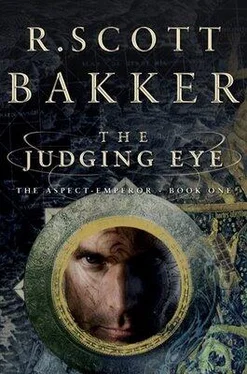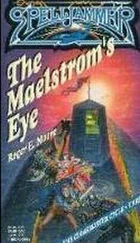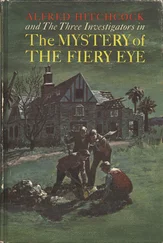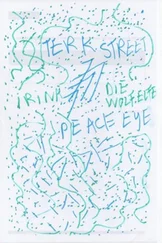R. Bakker - The Judging eye
Здесь есть возможность читать онлайн «R. Bakker - The Judging eye» весь текст электронной книги совершенно бесплатно (целиком полную версию без сокращений). В некоторых случаях можно слушать аудио, скачать через торрент в формате fb2 и присутствует краткое содержание. Жанр: Фэнтези, на английском языке. Описание произведения, (предисловие) а так же отзывы посетителей доступны на портале библиотеки ЛибКат.
- Название:The Judging eye
- Автор:
- Жанр:
- Год:неизвестен
- ISBN:нет данных
- Рейтинг книги:5 / 5. Голосов: 1
-
Избранное:Добавить в избранное
- Отзывы:
-
Ваша оценка:
- 100
- 1
- 2
- 3
- 4
- 5
The Judging eye: краткое содержание, описание и аннотация
Предлагаем к чтению аннотацию, описание, краткое содержание или предисловие (зависит от того, что написал сам автор книги «The Judging eye»). Если вы не нашли необходимую информацию о книге — напишите в комментариях, мы постараемся отыскать её.
The Judging eye — читать онлайн бесплатно полную книгу (весь текст) целиком
Ниже представлен текст книги, разбитый по страницам. Система сохранения места последней прочитанной страницы, позволяет с удобством читать онлайн бесплатно книгу «The Judging eye», без необходимости каждый раз заново искать на чём Вы остановились. Поставьте закладку, и сможете в любой момент перейти на страницу, на которой закончили чтение.
Интервал:
Закладка:
At night, the young King could simply close his eyes and refuse. This was the secret comfort of orphans: the ability to believe according to want and not world-whatever it took to numb the ache of things lost.
I miss her too, Da…
Almost as much as I miss you.
They sent a slave for him the following morning, an old, dark-skinned man almost comically bundled against the spring chill. Sorweel saw the dismayed looks traded between his Householders-slaves were anathema in Sakarpus-but he affected no anger or outrage. Even though no porters could be found, the outlander insisted, in the exasperated hand-waving way of demands made across linguistic divides, that he come immediately. Sorweel consented without argument, secretly relieved he wouldn't have to lead a procession out of the city-that he could pretend this was a mere outing rather than the abdication it seemed.
More than walls had been overthrown with the coming of the Aspect-Emperor.
The slave said nothing as they rode through the city. Sorweel followed with his eyes fixed directly forward, more to avoid the questioning gazes of his countrymen than to study anything in particular-save maybe the blasted heights of the Herder's Gate as they rose and fell out of view. He thought of the naive faith his people had put in their ancient fortifications-after all, who was the Aspect-Emperor compared to Mog-Pharau?
He thought of his father's blood cooked into the stone.
The Inrithi encampment lay a short distance beyond the pocked and blackened walls, its tented precincts sprawling across miles of field and pasture. It seemed at once mundane and legendary: a migratory city of wood, twine, and cloth, where the stink of latrines hedged every breath, as well as a vast assemblage, a vehicle great enough to carry the dread weight of history. The Men of the Ordeal trudged to and fro, supped at firepits, rolled armour in barrels of gravel, tended to gear and horses, or simply sat about the entrances to their tents, deep in eyes-to-the-horizon conversation. They paid scant attention to Sorweel and his guide as they wended through the avenues and byways of the camp.
The old slave led without hesitation. He pressed through this or that commotion-a brawl, a wain buried to the axles in muck, two stalled mule-trains-with the calm assertiveness of a caste-noble, turning down lesser mud tracks only when marching companies blocked their passage entirely. Without a word, he led Sorweel deeper and deeper into the encampment. The grim stares of Thunyerus became the exotic canopies of Nilnamesh became the haggling bustle of Cironj. Every turn, it seemed, delivered them to another of the world's far-flung corners.
Before meeting the Aspect-Emperor, Sorweel would have thought it impossible that one man could make an instrument of so many disparate souls. The Sakarpi were a sparse people. But even with their meagre numbers, not to mention common language and traditions, King Harweel had found it difficult to overcome their feuds and grudges. The more Sorweel pondered it, the more miraculous it seemed that all the Men of the Three Seas, with their contradictory tongues and ancient animosities, could find common purpose.
Everywhere he looked, he could see it, hanging slack in the windless morning: the Circumfix.
Wasn't there proof in miracles? Isn't that what the priests said?
Swaying to the canter of his horse, Sorweel found himself glancing at face after face, a stranger for every heartbeat, and finding bleak comfort in the careless way their looks skipped past him. There was a kind of safety, he realized, in the Great Ordeal's clamour. In the press of so many, how could he not be forgotten? And it seemed that this was the only true desire that remained to him: to be forgotten.
Then, in the uncanny way that familiar faces rise out of the anonymity of strangers, he saw Tasweer, the son of Lord Ostaroot, one of his father's High Boonsmen. Two Conriyan knights led him staggering, each holding chains welded to a collar about his skinned neck. His wrists were cruelly bound. His elbows had been wrenched back about a wooden rod. His hair was as wild as his eyes, and his parm, the traditional padded tunic of Sakarpi noblemen, hung stained, ragged, and beltless above bare knees.
The mere sight of him clutched the breath from Sorweel's throat, returned him to the rain-swept battlements, where he had last seen Tasweer-and his father. He could almost hear the crowing horns…
The young man did not recognize him, but rather stared with the unfixed intensity of those beaten back into the depths of themselves. To his shame, Sorweel looked away-to judge the weather across the horizon, he told himself. Yes, the weather. His horse felt reed-legged beneath him, like something wavering in the summer heat. The world smelled of mud cooking in the morning sun.
"Y-you?" a voice croaked from below.
The young King could not bear to look.
"Sorweel?"
Compelled to look down, he saw Tasweer gazing up at him, his once open face almost bewildered, almost horrified, even almost glad of heart, but in truth none of these things. The captive reeled to a halt, blinking.
"Sorweel," he repeated.
His Conriyan escorts cursed, flicked his chains in warning.
"No!" the prisoner cried, leaning against the links. A stubborn and helpless noise. "Nooo!" as they yanked him to his knees in the muck. "Sorweel! S-s-sorweel! Fight them! Y-you have to! Cut their throats while they sleep! Sorweel! Sor-!"
One of the square-bearded knights struck him full in the mouth, knocked him into rolling half-consciousness.
As had happened so many times since the city's fall, Sorweel found himself divided, struck into two separate souls, one real, the other ethereal. In his soul's eye he slipped from his saddle, his boots slapping into wheezing mud, and shouldered his way past the Conriyans. He pulled Tasweer to his knees, held his head behind the ear. Blood pulsed from the captive's nostrils, clotted the coarse growth rising from his jaw. "Did you see?" Sorweel cried to the broken face. "Tasweer! Did you see what happened to my father?"
But the bodily Sorweel simply continued after his guide, his skin porcelain with chill.
"Noooo!" pealed hoarse into air behind him, followed by raucous laughter.
The young King of Sakarpus resumed his study of the nonexistent weather. The true horror of defeat, a kernel of him realized, lay not in the fact of capitulation, but in the way it kennelled in the heart, the way it loitered and bred and bred and bred.
The way it made fate out of falling.
Eventually they came to the northern perimeter of the encampment, to a broad field whose greening expanse was marred by broad swaths of hoof-mudded turf and ornamented by stretches of blooming yellow-cress. Small groups of horsemen rode patterns at various intervals, answering to the booming cries of their commanders. They were doing squad drills, Sorweel realized, riding a hearty breed not so different from those used by Sakarpi Horselords.
The slave led him along a row of white-canvas tents, most of them stocked with various kinds of stores. Where the two of them had passed largely unnoticed before, now they drew stares, largely from clots of loitering cavalrymen. Several even called out to them, but Sorweel affected not to notice. Even well-wishes became insults when shouted in an unfamiliar tongue.
Finally the slave reined to a halt and dismounted before an expansive white pavilion. A crimson standard had been hammered into the ground beside the entrance. It bore a black Circumfix over a golden horse: the sign of the Kidruhil, the heavy cavalry that had caused Harweel and his High Boonsmen so much grief in the skirmishes preceding the Great Ordeal's arrival. A guard armoured in a gold-stamped cuirass stood motionless beside it; he merely nodded at the slave as he led Sorweel across the threshold.
Читать дальшеИнтервал:
Закладка:
Похожие книги на «The Judging eye»
Представляем Вашему вниманию похожие книги на «The Judging eye» списком для выбора. Мы отобрали схожую по названию и смыслу литературу в надежде предоставить читателям больше вариантов отыскать новые, интересные, ещё непрочитанные произведения.
Обсуждение, отзывы о книге «The Judging eye» и просто собственные мнения читателей. Оставьте ваши комментарии, напишите, что Вы думаете о произведении, его смысле или главных героях. Укажите что конкретно понравилось, а что нет, и почему Вы так считаете.












